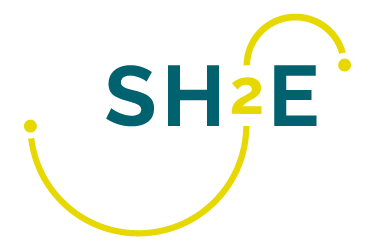SH2E
Sustainable Assessment of Harmonised Hydrogen Energy Systems
About the project

The SH2E project aimed to create internationally accepted guidelines for the sustainability assessment of fuel cells and hydrogen (FCH). More specifically, these guidelines will be a common ground addressing the environmental (LCA), economic (LCC) and social (SLCA) life cycle assessment of FCH systems, which then will be used to establish a basis for future standardisation at a global level.
The key outcomes are:
- Establishing a common ground for forthcoming standardisation of FCH.
- Develop user-friendly, open-access software tools for decision-makers to assess the sustainability of FCH solutions.
The initiative goes beyond previous projects working on the same field, such as the FC-HyGuide (2010-2011) and the IEA Hydrogen Task 36 (2020-2025), and expands on the topics of material criticality and prospective assessment.
Background
Produced only from water and electricity, hydrogen can become a renewable fuel source with the potential to decarbonise many industries.
An example is the energy industry. Unlike other renewable energies such as solar or wind, hydrogen can be supplied on demand and can also be stored, playing a crucial role in the supply of energy demand within the energy transition. Also, within the buildings sector, it can be blended with natural gas with the potential to move the whole gas network to hydrogen that feeds into hydrogen boilers and cells. On the other hand, in the transport industry, hydrogen presents a promising low-carbon option, with hydrogen-fuelled vehicles already seen in the Berlin police fleet or in London’s well-known red buses fleet.
The catch? Nowadays, hydrogen is mostly a non-renewable resource, as approximately three quarters of the global production is fuelled by natural gas [1]. This fossil fuel option is chosen due to the high costs attributed to the use of renewable fuel as an alternative to power hydrogen production. These costs, however, are estimated to fall 30% by 2030 [1], unlocking new opportunities for the development of fuel cells and hydrogen (FCH) technology.
Taking this into account, common international guidelines and co-operation in assessing the impact of FCH is key to enable the growth of clean hydrogen worldwide.
[1] IEA, (2019). The Future of Hydrogen. Available at: https://bit.ly/3p8hviV (Accessed: 10.05.2021)
GreenDelta in the project
GreenDelta is one of the main contributors to the project, providing expertise in life cycle sustainability. GreenDelta has led the review and definition of general and FCH-LCA guidelines, the definition of the FCH- SLCA guidelines, and the development of a user-friendly LCA tool specific for this project.
The development of the guidelines (LCA, SLCA & LCC) take previous work and projects as a reference and expands further, specifically on the topics of prospective assessment. The project also covered the implementation of a material criticality indicator. The guidelines were then reformulated and enlarged as a result, leading to the creation of an overall LCSA guideline.
These were then incorporated in a user-friendly LCA software tool enriched with LCC and SLCA modules, all tailored to the analysis of different FCH systems. The tool can be downloaded for free from here:
For a tutorial on the tool, please watch here: https://youtu.be/ocmWcnEGUxo?si=zLwGeXAj-IWdxaSC
To download the user manual draft for the tool, please click here
Partners
The parties that worked on this project are:

- IMDEA Energy Institute (Spain)
- GreenDelta GmbH (Germany)
- Commissariat a l’Energie Atomique et aux Energies Alternatives (France)
- SYMBIO (France)
- Fundacion para el Desarrollo de las Nuevas Tecnologías del Hidrogeno en Aragón (Spain)
- Forschungszentrum Julich GmbH (Germany)
- The Institute of Applied Energy (Japan)
Links and resources
Project duration: 2021 –2024
Project funded by the Horizon 2020 program under the Grant agreement 101007163.